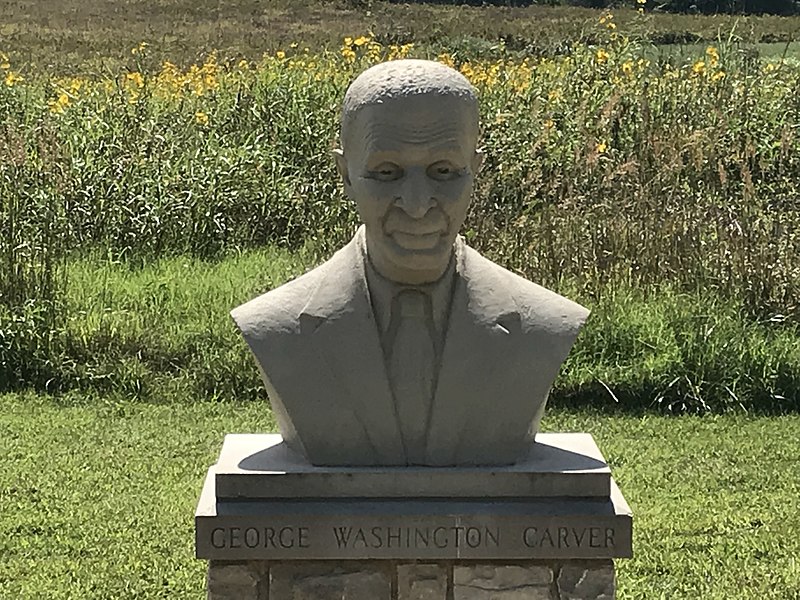George Washington Carver made remarkable contributions to environmentalism
March 5, 2022
When the name Washington comes up, who, or what, normally comes to mind?
Former U.S. President George Washington is probably the first thing you think of. Then maybe Washington State or Washington, D.C., comes to mind. However, one of the many important Washington’s in history doesn’t usually get the same immediate association.
That person is George Washington Carver. Carver was a Black environmentalist, professor, botanist, horticulturist and agriculturist. His work changed farming and food for years to come.
Thus, he is not only someone who deserves to be celebrated as part of Black History Month, but also someone who should always be recognized for his contributions to the world across multiple industries.
Carver was born in 1864 into a slave family, one year before slavery was outlawed, in Diamond, Missouri. His mother, Mary Carver, got her last name from the plantation’s owner, Moses Carver. George Washington Carver had a sister and a brother named James.
While Carver was a baby, he, his mother and his sister were kidnapped from their farm. Carver was later retrieved by Moses’s neighbor and was raised alongside James, by Moses and his wife, Susan. The boys were taught to read and write, and Carver also learned “how to cook, mend, embroider, do laundry and garden, as well as how to concoct simple herbal medicines.”
Even from a young age, Carver had an interest in plants, how they grew, how to take care of them and how to use them in herbal medicine.
At the age of 11 or 12, he left home to attend school in Neosho, Missouri. A couple of years after that, he moved to Kansas to get a better education. He changed schools a few times and graduated from Minneapolis High School in Minneapolis, Kansas.
He then got accepted into Kansas’s Highland College but was later rejected when the school found out he was Black. Carver went on to attend Methodist Simpson College in Winterset, Iowa. He originally studied art and piano before being pushed by a professor to go into agriculture.
Carver earned both a bachelor’s degree and a master’s degree in botany science from Iowa State Agricultural School, now called Iowa State University, in Ames.
This made him the first Black person to receive a bachelor’s degree in science.
After he graduated from graduate school, he was recruited for a professor position at the Tuskegee Institute, which is now Tuskegee University, in Alabama, by Booker T. Washington.
Carver and Washington grew close over their lives and they are even buried next to each other at the institute. The “Washington” in Carver’s name came from Booker’s.
The environmentalist then spent 50 years at Tuskegee, as the head of the agricultural department, managing the school’s two farms and doing research on different farming techniques, natural pesticides and uses for plants.
He came up with the idea of crop rotation. If one plot of land is used to grow only one species of plant continuously, it harms the soil over time. By rotating what kinds of crops are grown on the land every few years, the soil is naturally replenished, and the crop output is improved.
The “peanut man,” as he came to be known, Carver came up with more than 300 unique uses for peanuts, though not all were proven to work or were adopted into regular life. These included “milk, Worcestershire sauce, punches, cooking and salad oils, paper, cosmetics, soaps, wood stains, antiseptics, laxatives and goiter medications.”
Using soybeans, pecans and sweet potatoes, he was also able to create more than 500 shades of textile dye to color clothing during World War II.
Overall, Carver believed that nature is not just a tool for humans to use, but also a system that humans are an integral part of. He felt that people should work with nature to make sure people had healthy, nutritious food to eat and that people wouldn’t go hungry.
He believed that humans should take care of the earth and its inhabitants and was an early supporter of conservation and sustainability.
“As we are coming to understand 150 years later, Carver believed that in the natural world everything is a part of the whole,” according to an article from San Francisco Environment. “He understood that nothing exists in isolation, everything is inextricably connected, and ignoring that fact can have disastrous effects.”
Today, many years after Carver’s death, the rest of us are only just starting to catch up to him. The world would benefit greatly from having many more George Washington Carvers.
The least we could do to honor George Washington Carver’s work and legacy is celebrate him during Black History Month and on Earth Day, though he should be given recognition every day of the year









Steven Carver • Apr 11, 2022 at 1:53 pm
We can all be proud of men and women from whom lived a tough and arduous life and yet rise to greatness with proud people standing on,